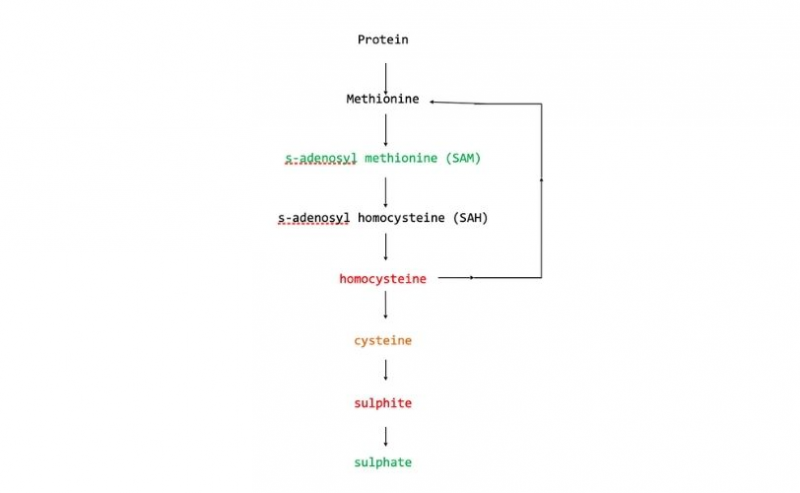How to combat a poor methylation cycle and high histamine
We all have gene variants (known as SNPs). This is because we are produced by sexual reproduction, which ensures we are all unique. We are not clones. If we were clones, one disaster like famine or pestilence could have wiped us all out. Being different from each other has served us well. It certainly makes life more interesting. However, there is a disadvantage. Some of us are more fragile than others.

Methyl groups are groups of four atoms, one carbon and three hydrogen atoms. The methylation cycle turns methionine from protein to S-adenosyl methionine, to S-adenosyl homocysteine, to homocysteine and either on to cysteine, sulphite and sulphate, or back to methionine.
I have coloured the compounds green for good ones, orange for partly good and partly bad, and red for bad. Vitamin A increases the conversion of s-adenosyl methionine (SAM) to s-adenosyl homocysteine (SAH), thus increasing the level of homocysteine, which is toxic. It also removes the SAM which we need to deal with compounds like histamine.

Going back from homocysteine to methionine involves either folate or synthetic folic acid. Then it involves vitamin B2 (riboflavin) which is needed by an enzyme called MTHFR. Then it requires vitamin B12, which is needed by an enzyme called methionine synthase, which remakes methionine. Homocysteine is so nasty that we need to remove it quickly, sending it either on to sulphate or back to methionine. It helps to have two ways of dealing with something nasty.
Those whose methylation is very bad die of heart disease in childhood. Others who have seriously poor methylation produce babies with spina bifida or cleft palate.
Very many people have some gene variants affecting this methylation process. In particular, many people have variants of the MTHFR gene. Having enough vitamin B2 enables us to make our MTHFR work as well as it can.
Methylation cycle issues
It is crucial for those with methylation issues:
1. to avoid boron supplements, as they deplete vitamin B2
2. to have a low boron diet (forget the soya and the tomato sauce!)
3. to avoid progesterone and synthetic progesterone-like hormones, which deplete vitamin B2
4. not to have more vitamin B6 than vitamin B2, as your B2 will be used to activate the B6, leaving too little for other functions
5. to avoid drugs that deplete vitamin B2 or folate (for example some antimalarials)
6. to avoid vitamin A supplements including many antioxidant supplements, multivitamins and fish liver oil
7. to avoid a high vitamin A diet
8. to avoid liver, a rich source of vitamin A
9. some people even have to reduce their level of beta carotene, which the body converts to vitamin A. It depends how avidly you convert it, and that depends on another gene.
Cheap synthetic folic acid and avoiding vitamin A supplements have cut the number of damaged babies considerably. So even these severely affected mothers mostly cope with folic acid, so long as they do not supplement vitamin A. The advice would be better if they were also told to take vitamins B2 and B12. Very few people have to have methyl B12 and methylfolate, rather than the cheaper vitamin B12 and folic acid tablets.
Nutrition is another team process, and depending on just one nutrient rarely works.
Yes, I prefer methyl folate and methylB12, but points one to nine are much more crucial. Most if not all people who have a problem taking folic acid are not keeping to points one to nine. Carefully chosen nutritional supplements can mitigate the effects of gene variants, but badly chosen ones can make things worse.
Many of my chemically sensitive clients have tests showing low riboflavin, which is easily corrected, leading to increased sulphate and methyl groups to deal with chemicals, as well as better production of energy, hormones and enzymes.
Gene problems are sometimes multiple. For example, people may have poor ability to add methyl groups to histamine, and also poor ability to add sulphate to histamine. That will compound the problem. The level of histamine will be too high, leading to inflammation around the body. In particular, the brain may be inflamed, which leads to severe depression and even suicide.
A sports team would not put all its money into securing one top player. All the players need to be good. Nutrition is another team process, and depending on just one nutrient rarely works.

Find the right nutritionist for you
All nutrition professionals are verified
